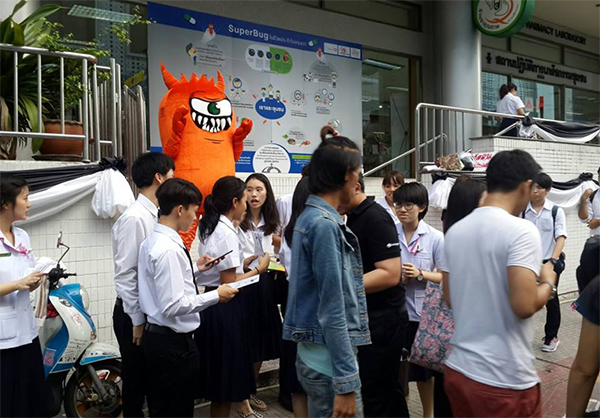2016-11-20
Puppet shows, songs, exhibitions and outreach activities in hospitals, pharmacies, colleges and public meeting places in Bangkok marked the World Antibiotic Awareness Week in Thailand. The activities were organized by several civil society groups together with hospitals and the Thai Ministry of Public Health around the Thai capital city, involving hundreds of citizens as part of an effort to raise awareness about the threat of antibiotic resistance.

Among the organizers of several events for the World Antibiotic Awareness Week were ReAct Asia Pacific’s partners Drug Systems Monitoring and Development Center (DMDC) and the Thai Health Foundation. Activities carried out included workshops, press conferences, radio shows, distribution of ReAct material and interaction with members of the public curious to know more about the subject.
“The Thai media showed much interest in implications of antimicrobial resistance for Thailand and there is growing public awareness too about the problem now.”
said Dr Niyada Kiatying-Angsulee, Manager, DMDC.
Multi-drug resistant bacterial infections causes 19,000 deaths in Thailand each year
Using data from nine public hospitals from 2004 to 2010, a recent study showed that multi-drug resistant bacterial infections caused an extra 19,000 deaths in Thailand each year. This estimate is about 3 to 5 times larger than those for the United States and European Union.
The study also showed that more of the bacteria collected from patients are resistant to multiple antimicrobial drugs and that the burden of antimicrobial resistance in Thailand is worsening over time.

Thailand adopted a National Strategic Plan on antibiotic resistance in 2016
However, Thailand also has a good record of addressing antibiotic resistance through various interventions through its health system and also creative initiatives to involve ordinary citizens in responding to the challenge. Thailand adopted a National Strategic Plan on antibiotic resistance in August 2016 and in recent years has stepped up surveillance, hospital infection control measures and education of physicians, nurses and community health workers.
Thailand’s Antibiotic Smart Use (ASU) program, initiated in 2007 by the Thai Food and Drug Administration, for example, involves mobilization of both hospital staff and communities to understand rational use of antibiotics. It advocates non-use of antibiotics for three diseases – diarrhea, colds and simple wounds while promoting alternative ways of dealing with these ailments in a safe and effective way.

For more information visit Thai antibiotic awareness on Facebook.
